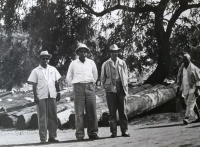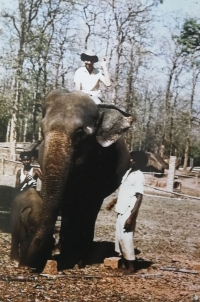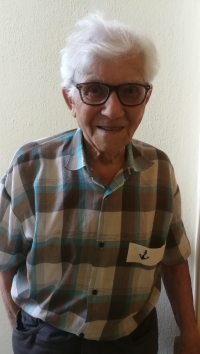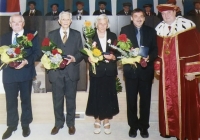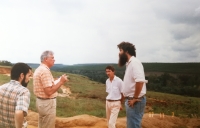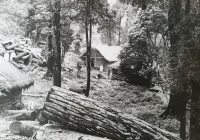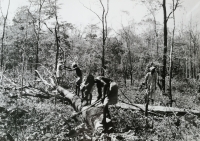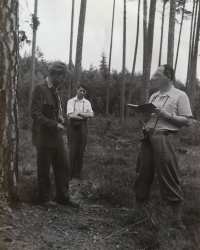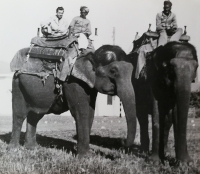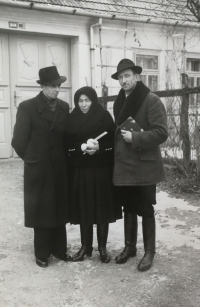Prof. Ing., DrSc. Ján Borota
* 1925
-
There were great battles in Cetun. There were raids. Usually, when the Germans went at the partisans, the partisans ran away, withdrew, were informed. For example, they told me, I had such a task, to meet those soldiers in the tavern, to have a talk with them, to say a few words. And there I got acquainted and they told me, they complained at night, early in the morning we go to the partisans. And my job was to go to warn [the partisans] into the hills. So I went alone, that was certain, as a boy, to Vrzavka, that was the first settlement and there was Magal, that was the first house. There I knocked on the window, Mr. Magal dressed quickly, and cunningly went upstairs to give the announcement, because by coincidence they were staying there and the partisans had withdrawn. So the Germans came and found nobody. All right. The locals treated them, they knew what was due, and nothing happened.
-
There was one very poor family, I should point out. One of them was slightly mentally disturbed. They laughed at him. He wanted to marry everybody. He was mentally unwell. His brother got married, he had a little baby that wasn't even year old, they took him, loaded him on some peasant's wagon and took him to Nove mesto, loaded him on the wagons and they went. That's what I'll tell you about, about this family. People felt sorry for them. But they took more from them, they had some chickens or something, as it used to be in the village... they paid, what is money for anyway... They said, leave it. In such a human way... I mean, we didn't know, of course. Only after the war, or the end of the war we found out. There was this group of people in the village, led by a peasant, and they had a contract on some farm in Austria, let's say, or in Moravia, or wherever. They worked there and he kept records of it so that they wouldn't be corrupted. When they were, they got more money. He knew German well, by being in Austria, and he arranged with this Jew who took them, with this brother, that he would write. And so it was that he sent them a package, this acquaintance of ours from Austria, a package to the extermination camp, they didn't know it was an extermination camp, the address was quite different. And then he wrote back to them saying thank you for the parcel. They received it, imagine, such a situation. But from Austria, if he got it from Slovakia, they wouldn't give anything. And the thing was, he wrote that the baby and his wife were no longer with us. Richard (the poor guy) is herding cows and I'm suffering, barely surviving. After that nothing else arrived.
-
Už bola vtedy stanovená Uhrova partizánska skupina. Rozhodli... Slovenská, žiadna nejaká, že by tam boli Rusi alebo tak. Naši ľudia to všetko organizovali. No a ten Uher bol poddôstojník v zálohe, ale bol schopný človek, tak dostal dôveru. No a organizoval ľudí, jednak cudzincov, čo tam boli nejakí Rusi po kopaniciach mladí, čo išli, nastúpili, ale Slováci hlavne. Česi tam prišli dvaja neskôr, ale neboli tam. A Poliaci boli, tiež čo utekali z lágrov a neviem ešte ktorí. Tie zbrane sme potom odviezli asi po desiatich dňoch, naložili, zavolali farmára, ktorý ich naložil na voz a ja som ich odprevádzal. My sme boli vtedy takí hlúpi, vôbec sme nebrali v úvahu, že by nás mohli Nemci prepadnúť, že by mohli ísť po ceste. Tak sme viezli po hlavnej ceste. Nikto nás nenaháňal. Ale aj Nemci sa báli spočiatku.
Uhr's partisan group had already been established by then. They decided... Slovak, no, there were no Russians or anything. Our people organised it all. Well, this Uher was a non-commissioned officer in the reserve, but he was a capable man, so he was trusted. Well, he organised people, both the foreigners, there were some Russians on the hills, young people who joined, got in, but Slovaks mainly. Two Czechs came later, but they weren't there. And there were Poles, also who had escaped from the camps, and I don't know who else. Then we took the weapons away after about ten days, loaded them, called a farmer who loaded them on a wagon and I escorted them. We were so stupid at that time, we didn't take into account at all that the Germans might ambush us, that they might come along the road. So we drove along the main road. Nobody chased us. Even the Germans were afraid at first.
-
Full recordings
-
Bratislava, 23.06.2021
(audio)
duration: 01:50:31
Full recordings are available only for logged users.
As a partisan liaison, I had the task of getting into a conversation with the German soldiers in the tavern. When they revealed that they were going to attack the partisans early in the morning, I ran to warn them
Ing. Ján Borota, DrSc. was born September 17, 1925 in Horne Bzince as one of two brothers. During his studies at the grammar school in Nové Město nad Váhom he helped in the Slovak National Uprising (SNP) as a partisan liaison. He supplied the partisans, warned them against the Germans, helped the refugees. He graduated in 1946. After the war he joined the Communist Party. He began to study at the University of Agricultural and Forest Engineering in Košice, completed his second year at the Faculty of Forestry at the University of Agriculture in Brno and finished his studies at the Faculty of Forestry and Wood Technology at the Czech University of Agriculture in Prague (1950). After graduation, he started working as an assistant at the Department of Forest Management. In 1953 he married Eva Podhradská, and had a son Ján (1954) and a daughter Lucia (1956). In 1957 Ján defended his doctoral thesis. From 1963 to 1987 he worked as a renowned forestry expert in developing countries in Asia and Africa. After the death of his wife, he went to work at the University of Forestry and Wood Technology in Zvolen. In 1974, he became head of the Department of World Forestry and Wood Science. In 1985 he married Justina, née Kapustová, and they moved to Bratislava. In 1987 he received the degree of Doctor of Science. In 1991 he was appointed professor. He retired in 1992. In retirement, he received two Rector’s Awards for his contribution to the field of forestry. In 2021 he was living in Bratislava.
